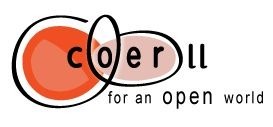Description provided by COERLL:
COERLL hosted an online “OER hangout” on September 25th on the subject of creating open educational resources (OER) with students. With 26 people attending, five language instructors shared their experiences of working with their students to create openly licensed resources for teaching and learning:
Amber Hoye and Kelly Arispe lead the Boise State University Department of World Languages’ Pathways OER Language Teaching Repository of openly licensed proficiency based activities, created by students and teachers.
Kathryn Murphy-Judy, Ngoc-My Guidarelli, and Laura Middlebrooks are part of a team of faculty at Virginia Commonwealth University who have developed an open, connected platform for students to share authentic resources.
At Boise State, upper-level undergraduate students, with the mentorship of staff and faculty, create activities to be used in the weekly language lab component of introductory language courses. These activities can also be used in the classroom and K-12 teachers in Idaho have been involved in creating and teaching with them. At Virginia Commonwealth University, undergraduate students in the 202 class, who are either majors on their way to upper level courses or students finishing their language requirement, curate authentic resources and discuss them with native speakers. Then, upper level students turn those curations into instructional modules, which are being integrated into online open textbooks.
You can learn more about the logistics of these projects by viewing the webinar video, reading about the projects, and perusing the materials. Here, we’ll mention a few of the important themes that came up during the discussion.
One important element of students being involved in materials creation is that they understand what other students will be interested in and can choose topics and texts they know their peers will enjoy. Involving students ensures that a more diverse array of voices and perspectives are represented in the materials, and gives students more of a choice in their own education. Students also gain skills beyond language and culture when they work on these projects: digital citizenship, open license knowledge, technical skills, an understanding of language proficiency, and knowledge of state and national standards.
Each of these projects has a broad community of people with various skills who can support each other and contribute in different ways. At Boise State, the language resource center director, language students and students from other departments, faculty mentors, SLA & CALL researchers, K-12 teachers, state partners, and librarians have all contributed to the OER. At VCU, students, faculty, and librarians contribute to the materials and partnerships are developing with K-12 teachers who use the materials in their courses.
Each of these projects follows an iterative process of development. The work doesn’t start and finish in the span of a semester, it grows and changes. Students develop materials, native speakers proofread them, teachers teach with them, and the team refines them. The Pathways Project carries a disclaimer that “The activities on the Pathways Project OER Repository were created by upper-division students at Boise State University and serve as a foundation that our community of practice can build upon and refine. While they are polished, we welcome and encourage collaboration from language instructors to help modify grammar, syntax, and content where needed.” The cycle of the projects is such that lower-level students can get involved in the project as learners, but go on to take a more active role in the project as they progress.
The panelists recommend to anyone interested in creating OER with their students that they start small, and reach out to available communities (institution-wide, or online professional networks) for support and sharing. On that note, COERLL’s next OER hangout is on the topic of joining a teacher community. Join us on November 13th!
View the webinar video, links to the repositories, slides from the presenters, and more on the event page of COERLL’s website.

